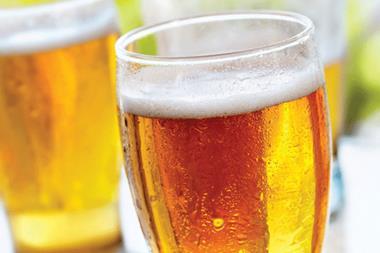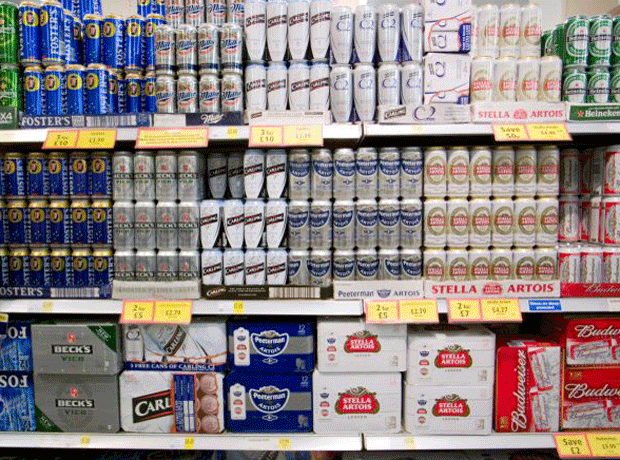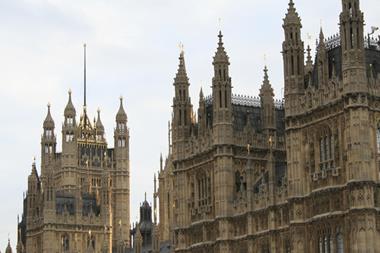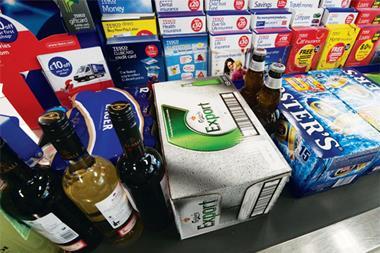It’s been a jubilant 24 months for alcohol industry lobbyists, the latest cheers coming last week after the Budget.
A year after signalling the death knell for minimum pricing, the Chancellor’s latest Budget scrapped the alcohol duty taxation escalator and lopped another penny off a pint.
Booze in numbers
£21bn: annual cost to society of alcohol problems (PHE)
624: deaths prevented per year by year 10 if 45p MUP brought in (Sheffield University) - reviewed down from…
2,000: deaths prevented per year by year 10 predicted in 2009 study
1,000: deaths a year prevented by removing 1bn units (DH)
6,000: jobs saved by scrapping alcohol escalator (E&Y)
In a further twist to the government’s u-turning alcohol policy, the measures meant that tax on high-strength beers - described by the PM as the “scourge of society” in 2012 - fell 0.75%.
So as the Tories urged voters to hit the bingo hall and raise a glass to George, have the industry’s numbers really all come up at once or could there yet be a string in the tail?
Minimum pricing - as well as a proposed clampdown on multibuy booze deals - may be dead, replaced by a watered-down scheme to ban below-costs sales, kicking in next month. But the controversy raging over the government’s policy and the role of industry is anything but.
In January the BMJ ran an investigation claiming to lift the lid on the cosy relationship between the coalition and drink lobbyists, “revealing” dozens of clandestine meetings. In fact, the vast majority, as The Grocer revealed at the time, were scheduled meetings of the Responsibility Deal, also involving a range of NGOs.
But The Grocer understands the BMJ is set for a fresh assault. Alcohol companies and retailers have been bombarded with Freedom of Information Requests, which appear to focus on the industry’s 2012 pledge to remove a billion units of alcohol from the market by 2015.
Anticipated by then-health secretary Andrew Lansley to prevent 1,000 deaths a year, the first major round of reporting on progress is due next month. “The journalist has been asking companies for the figures, which of course no company in its right mind would give because there is a reporting process, which means they must go to the DH,” says one industry source. “We believe they are trying to do a hatchet job, which will suggest the figures are being kept secret and the Portman Group (the industry self-regulatory body) is in some way trying to manipulate them.” “This investigation is funded by the BMA. You have to ask if it’s a good use of the BMA’s time and money.”
A source at one leading supermarket adds: “I think the figures, when they come in, will show that if anything the industry is ahead of target,” says a source at one leading supermarket. “I’m surprised they are trying to attack it.”
However, campaigners will no doubt seize on the admission at the last meeting of the Responsibility Deal’s Alcohol Network, eight months ago, that the unit reduction will “not have an impact on those drinking at the most harmful levels.”
“Anything seen as nanny state is quite simply off the agenda”
Retail source
It’s not the only thing making the Network vulnerable to attack, having been viewed as close to collapse after last summer’s walkout by almost all the participating NGOs because of the MUP backtrack. “I’m quite sure the consensus among people who want to make a difference to alcohol harm is that these voluntary deals are almost completely worthless,” said one network member at the time.
In February, home office minister Norman Baker attacked the industry for having failed to act on a call last July to take new voluntary measures on booze - and claimed patience was running out.
However, The Grocer understands a new pledge under the Deal is set to be thrashed out next month, believed to involve all the major supermarkets, which will focus on marketing in-store.
One supermarket source insisted it would go beyond existing Portman Group guidelines. “The government wants us to finalise the pledge by next month. We are discussing measures we can take on the shop floor, which would discourage irresponsible drinking.”
The government has apparently stopped short of calling for a ban on alcohol displays in foyers - despite previous attempts under Lansley that only Asda temporarily agreed to. And it appears highly unlikely to follow Scotland’s policy of confining drinks displays to limited areas of a store. “Anything that is seen as nanny state is quite simply off the agenda,” says one retail source.
Alcohol education in schools
The government is, however, likely to press ahead with a long-delayed plan for a major alcohol education programme in schools, funded by the industry. “I’m hearing that the work is going to pave the way for this,” says one member of the Network. “All it needs now is for the alcohol industry to put their money where their mouth is. The aim is for the money to go into a blind trust so the industry would have no say in how it is spent. For this to be a credible national scheme, we need to be looking at millions.”
But what about David Cameron’s main target - cheap, high-strength booze?
Much has been left to a series of local crackdowns, with the poster child Suffolk Police’s Reducing the Strength Campaign. What began two years ago as part of a 36-point plan to tackle a group of 70 hardened street drinkers in Ipswich has morphed into a war on high abv by nearly 100 local authorities and police forces, which has split the industry.
Whereas the Ipswich scheme, backed by the likes of the East of England Co-op , Tesco and Sainsbury’s, involved the voluntary removal of cheap high-strength beers such as White Star cider, Co-op super strength beer, Tennent’s Super and Carlsberg Special Brew, other schemes, warns Portman Group chief executive Henry Ashworth, have gone much further. In the past few months alcohol as low as 5.5%, craft as well as cheap, has been removed from shelves, with Ashworth warning one element of the Ipswich scheme has become seen as a “silver bullet”.
And while Ipswich is an example of a highly targeted, local scheme, with police even offering to pay for a one-way ticket to Romania for one of the street drinkers, it poses “highly concerning” competition concerns.
“One of the products that was allowed, because it was local, was a high-strength Aspall Cider,” says Ashworth. “But an identical strength Westons product, a direct competitor, had been taken off the shelves.”
The WSTA, the ACS, BBPA and the National Association of Cider Makers are urging the OFT to declare such schemes illegal and have cited the case of the drink Buckfast, which won a court case - and apology - from police in Scotland as a result of an overzealous ban.
Sources tell The Grocer that the OFT’s lack of intervention is because of its forthcoming merger with the Competition Commission to form the Competition and Markets Authority, due to be completed next week, with the new body said to be likely to act.
In the vacuum, the issue of high-strength booze has seen supermarkets turn on c-stores, pubs and clubs, blaming them for the problem.
“85% of high strength beer and cider that involved in models like Ipswich is coming from convenience stores and most of this stuff hasn’t been on supermarket shelves for years,” says Paul Kelly, external affairs adviser at Asda. And where it is sold by the mults it is also much more expensive, he adds. He also accuses clubs and pubs of “holding back cultural change” with promotions such as buy two glasses of wine get one free and claims supermarkets have been unfairly “demonised” for their role in the UK’s alcohol problems. “Consumers don’t want to be dictated to,” he argues, “not by retaliers and not by the government.”
Yet with alcohol’s cost to society estimated by Public Health England at £21bn a year, the spotlight on the industry, despite the Budget, doesn’t look like going away for long.


















No comments yet